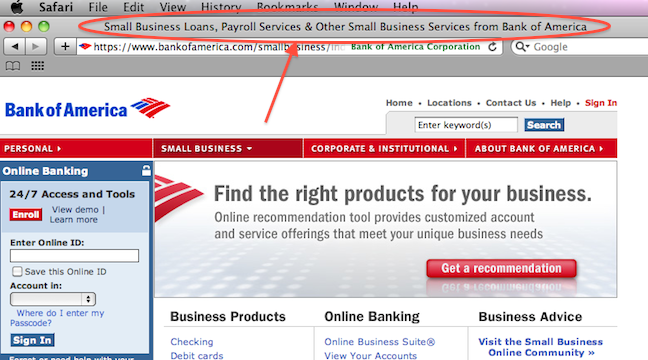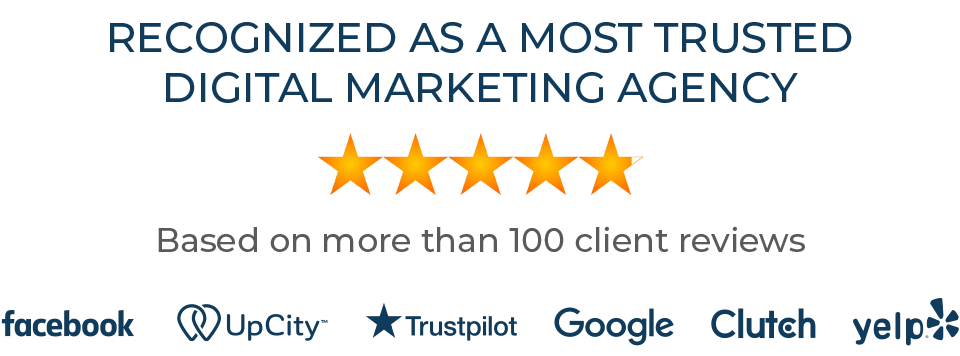Search engine optimization, or SEO, is one of the most important and misunderstood topics for small business owners. From restaurants to attorneys, and landscapers to accountants, many entrepreneurs often lack a solid understanding of SEO basics. In this post, we’ll clear up common misconceptions and provide insight into something that is the foundation of SEO: Keyword selection
Choosing the right focus keywords is really what makes or breaks most web content and SEO strategies.
Pick something too broad and you’ll get lost in the crowded online market with the rest of your competitors.
Pick something too specific, and you risk wasting your efforts and even alienating prospective customers looking for an experience or service like the one your business offers.

Finding the best keywords for your strategy is like Goldilocks picking the perfect bowl of porridge. You’ve got to find the keywords that are not too hot, not too cold, but just right, or your SEO strategy will fall flat.
Keywords
Simply put, keywords are search queries used by people on Google, Bing, or other search engines. They are the words people type into a search engine that will (hopefully) bring them to your page.
Selecting the correct keywords to target for your website is critical to SEO success.
We often work with small business owners who agonize over keyword selection. Luckily for you the reality is that keyword selection for most industry takes a little research, but is actually pretty simple.
Keyword Selection: How to Choose Keywords
There are three types of search queries to focus on:
- Location Based
- Trending
- Long Tail Keywords
Location Based Keywords
These are your bread and butter keywords. Location based keywords should include your location and the type of property you have. Let’s say you own an AC Repair business in Tampa. Your primary location based keywords are going to be “Tampa AC Repair” or maybe “air condition tech Tampa” Pretty simple, right?
Long Tail Keywords
These keywords are much more specific. They can be used to promote content that is related to seasonal events, activities, or any other topic that generates awareness of your property.
How do you find long-tail keywords?
This requires a bit of research on your end. But, it can help to target the actual language your prospective clients use. This serves as an effective way to uncover how they are describing their needs and the words they would type into a search engine in order to fulfill them.
It can help to study your online reviews to get better information on this. Look at what specific language your previous customers are using to describe your services and company.
This can be one way to find long-tail keywords that will be successful. You should also look at how people are describing your competitors.
Trending Keywords
Another strategy to get your content ranked on Google quickly is to target trending topics or current events.
Essentially, the idea is to be one of the first sources of information on a breaking topic or event, while journalists are still scrambling for details.
Newsjacking can be hit or miss, depending on various factors, but it can help in a couple of ways to get your business’s website discovered on Google very quickly.
First, when you create content on trending topics, it is more likely to show up in the Google News section above the organic search rankings. If you can accomplish this, Newsjacking will pay off in a big way with a flood of fresh traffic to your site.
Second, even if it doesn’t show up in the News section, content you create on trending topics may also get picked up in Google’s organic rankings quickly because their algorithm is constantly searching for content on trending topics and pages that were most recently updated.
Third, if you can be one of the first sources of information on that event when journalists are scrambling for details, and your site ranks high in organic rankings, you may get a lot of referral traffic from articles that quote your content as a source of information.
Again, this can be a little tricky. You won’t be the only one creating content on these trending topics so you’ll want to make sure you’re not just spitting out the same information as everyone else.
You need to inject your reporting with your own unique insights and point of view on the subject.
How to Implement Your Keywords
Once you have selected the keywords you would like to rank for, it’s time to implement them on your site. Here are a few examples of how to do that:
Title Tags
Title tags are HTML elements that the search engines use as the link within a Search Engine Results Page, or SERP. Keep in mind that your title tags should be short and unique to each page of your website. Choose simple but powerful title tags to make your property stand out on the SERP. Creating perfect title tags is a fine art and may take some time to master.

Remember this formula for crafting effective Title Tags:
Page Topic + Your Brand + Property Type + Location
That’s the formula to use 99% of the time.
Here’s an example of a strong Services Page Title Tag:
Services | Don’s Landscaping Company | Sarasota Landscaper | Sarasota FL
Note that in this title tag we have states the Page Topic (Services), Brand (Don’s Landscaping), Business Type (Sarasota Landscaper), and Location (Sarasota FL).
Meta Descriptions
Meta descriptions do not impact organic search rankings, but they can improve click through rates. Make sure that your descriptions are short and unique to each page. Feel free to use calls to action or marketing related copy to entice searchers to click on your organic listing.
Here is an example of an effective Meta Description for an Attorney ‘About’ Page:
Highly reviewed Miami criminal defense attorney Mike Montgomery works with tirelessly to defend his clients rights. Specializing in DUI defense, schedule our free consult today.
This meta description has pointed out what makes the attorney unique, mentioned its specialty and target keyword, and even includes a call to action.

Headings
Headings, such as H1, H2, H3, etc. are an ideal opportunity to include keywords. Heading tags are part of the HTML coding for a Web page and are important because they help provide categorization within the search engine.
Alt Tags
Your images are another opportunity to utilize keywords. “Alt tags” describe the image and its function on the page. Add “alt” text to your images and include target keywords within them.
Keyword Selection is the Foundation of SEO
We cannot stress this enough: Keyword Selection is the foundation of SEO. You invested in a website because you wanted to give potential customers clear and easy access to the information they need in order to contact you for your services.
Identifying your keywords, and implementing them correctly, can mean the difference between more direct customers and not being found at all.
SEO compounds over time, so the sooner you start using the types of keywords that your prospective customers and clients are using to search for your services, the better results you’ll get over time. Improving your website’s search ranking for these terms will not only improve its overall authority, but it will also help increase the rank of your other keywords in the process. More traffic to your website will give you more opportunities to convert the potential customers into paying clients.
Cheers!
Search engine optimization, or SEO, is one of the most important and misunderstood topics for small business owners. From restaurants to attorneys, and landscapers to accountants, many entrepreneurs often lack a solid understanding of SEO basics. In this post, we’ll clear up common misconceptions and provide insight into something that is the foundation of SEO: Keyword selection
Choosing the right focus keywords is really what makes or breaks most web content and SEO strategies.
Pick something too broad and you’ll get lost in the crowded online market with the rest of your competitors.
Pick something too specific, and you risk wasting your efforts and even alienating prospective customers looking for an experience or service like the one your business offers.

Finding the best keywords for your strategy is like Goldilocks picking the perfect bowl of porridge. You’ve got to find the keywords that are not too hot, not too cold, but just right, or your SEO strategy will fall flat.
Keywords
Simply put, keywords are search queries used by people on Google, Bing, or other search engines. They are the words people type into a search engine that will (hopefully) bring them to your page.
Selecting the correct keywords to target for your website is critical to SEO success.
We often work with small business owners who agonize over keyword selection. Luckily for you the reality is that keyword selection for most industry takes a little research, but is actually pretty simple.
Keyword Selection: How to Choose Keywords
There are three types of search queries to focus on:
- Location Based
- Trending
- Long Tail Keywords
Location Based Keywords
These are your bread and butter keywords. Location based keywords should include your location and the type of property you have. Let’s say you own an AC Repair business in Tampa. Your primary location based keywords are going to be “Tampa AC Repair” or maybe “air condition tech Tampa” Pretty simple, right?
Long Tail Keywords
These keywords are much more specific. They can be used to promote content that is related to seasonal events, activities, or any other topic that generates awareness of your property.
How do you find long-tail keywords?
This requires a bit of research on your end. But, it can help to target the actual language your prospective clients use. This serves as an effective way to uncover how they are describing their needs and the words they would type into a search engine in order to fulfill them.
It can help to study your online reviews to get better information on this. Look at what specific language your previous customers are using to describe your services and company.
This can be one way to find long-tail keywords that will be successful. You should also look at how people are describing your competitors.
Trending Keywords
Another strategy to get your content ranked on Google quickly is to target trending topics or current events.
Essentially, the idea is to be one of the first sources of information on a breaking topic or event, while journalists are still scrambling for details.
Newsjacking can be hit or miss, depending on various factors, but it can help in a couple of ways to get your business’s website discovered on Google very quickly.
First, when you create content on trending topics, it is more likely to show up in the Google News section above the organic search rankings. If you can accomplish this, Newsjacking will pay off in a big way with a flood of fresh traffic to your site.
Second, even if it doesn’t show up in the News section, content you create on trending topics may also get picked up in Google’s organic rankings quickly because their algorithm is constantly searching for content on trending topics and pages that were most recently updated.
Third, if you can be one of the first sources of information on that event when journalists are scrambling for details, and your site ranks high in organic rankings, you may get a lot of referral traffic from articles that quote your content as a source of information.
Again, this can be a little tricky. You won’t be the only one creating content on these trending topics so you’ll want to make sure you’re not just spitting out the same information as everyone else.
You need to inject your reporting with your own unique insights and point of view on the subject.
How to Implement Your Keywords
Once you have selected the keywords you would like to rank for, it’s time to implement them on your site. Here are a few examples of how to do that:
Title Tags
Title tags are HTML elements that the search engines use as the link within a Search Engine Results Page, or SERP. Keep in mind that your title tags should be short and unique to each page of your website. Choose simple but powerful title tags to make your property stand out on the SERP. Creating perfect title tags is a fine art and may take some time to master.

Remember this formula for crafting effective Title Tags:
Page Topic + Your Brand + Property Type + Location
That’s the formula to use 99% of the time.
Here’s an example of a strong Services Page Title Tag:
Services | Don’s Landscaping Company | Sarasota Landscaper | Sarasota FL
Note that in this title tag we have states the Page Topic (Services), Brand (Don’s Landscaping), Business Type (Sarasota Landscaper), and Location (Sarasota FL).
Meta Descriptions
Meta descriptions do not impact organic search rankings, but they can improve click through rates. Make sure that your descriptions are short and unique to each page. Feel free to use calls to action or marketing related copy to entice searchers to click on your organic listing.
Here is an example of an effective Meta Description for an Attorney ‘About’ Page:
Highly reviewed Miami criminal defense attorney Mike Montgomery works with tirelessly to defend his clients rights. Specializing in DUI defense, schedule our free consult today.
This meta description has pointed out what makes the attorney unique, mentioned its specialty and target keyword, and even includes a call to action.

Headings
Headings, such as H1, H2, H3, etc. are an ideal opportunity to include keywords. Heading tags are part of the HTML coding for a Web page and are important because they help provide categorization within the search engine.
Alt Tags
Your images are another opportunity to utilize keywords. “Alt tags” describe the image and its function on the page. Add “alt” text to your images and include target keywords within them.
Keyword Selection is the Foundation of SEO
We cannot stress this enough: Keyword Selection is the foundation of SEO. You invested in a website because you wanted to give potential customers clear and easy access to the information they need in order to contact you for your services.
Identifying your keywords, and implementing them correctly, can mean the difference between more direct customers and not being found at all.
SEO compounds over time, so the sooner you start using the types of keywords that your prospective customers and clients are using to search for your services, the better results you’ll get over time. Improving your website’s search ranking for these terms will not only improve its overall authority, but it will also help increase the rank of your other keywords in the process. More traffic to your website will give you more opportunities to convert the potential customers into paying clients.
Cheers!
Published on August 10, 2017

